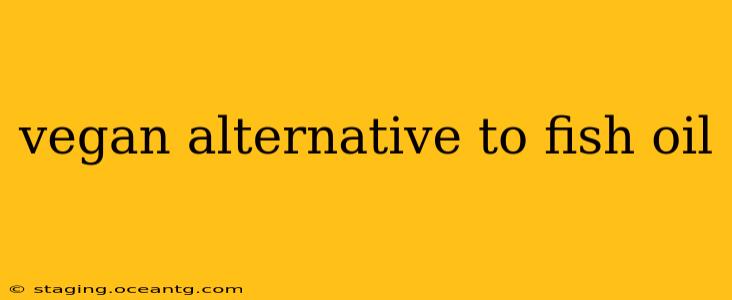Fish oil, long touted for its omega-3 fatty acid content, particularly EPA and DHA, is a popular supplement. However, for vegans and vegetarians, finding a suitable alternative is crucial. This comprehensive guide explores effective vegan options to reap the benefits of omega-3s without compromising your ethical values.
What are the benefits of Omega-3 fatty acids?
Before diving into alternatives, let's understand why omega-3s, specifically EPA and DHA, are so important. These essential fatty acids are vital for numerous bodily functions, including:
- Heart health: Reducing triglycerides and blood pressure, contributing to a lower risk of heart disease.
- Brain health: Supporting cognitive function and potentially reducing the risk of age-related cognitive decline.
- Eye health: Protecting against macular degeneration and dry eye syndrome.
- Joint health: Reducing inflammation and potentially easing symptoms of arthritis.
- Mental health: Some studies suggest a link between omega-3 intake and improved mood and reduced symptoms of depression.
What are the best vegan alternatives to fish oil?
While our bodies can produce some omega-3s, they can't synthesize EPA and DHA. Therefore, dietary sources are essential. Fortunately, several excellent vegan alternatives provide these crucial fatty acids:
1. Algae Oil:
This is the most direct vegan alternative to fish oil. Fish obtain EPA and DHA by consuming algae, so algae oil is the original source. Supplements derived directly from algae are a pure and potent source of these fatty acids, making it a top choice for vegans.
2. Flaxseed Oil:
Flaxseed oil is rich in ALA (alpha-linolenic acid), an omega-3 fatty acid. While the body can convert ALA into EPA and DHA, the conversion rate is relatively low. Therefore, flaxseed oil is a good supplement to increase your overall omega-3 intake, but it's not a direct replacement for EPA and DHA. It's best used in conjunction with other sources.
3. Chia Seeds:
Similar to flaxseed, chia seeds are a good source of ALA. They're also a great source of fiber and other nutrients. Like flaxseed oil, chia seeds contribute to overall omega-3 intake but don't offer the same EPA and DHA levels as algae oil.
4. Hemp Seeds:
Hemp seeds offer a decent amount of ALA, contributing to your overall omega-3 intake. They're also a good source of protein and other essential nutrients. Again, the ALA conversion is a limiting factor for direct EPA and DHA replacement.
5. Walnuts:
Walnuts contain a smaller amount of ALA compared to flaxseeds and chia seeds, but they still contribute to your overall omega-3 intake and are packed with other beneficial nutrients.
How much algae oil should I take daily?
The recommended dosage of algae oil varies depending on individual needs and health goals. It's always best to consult a healthcare professional or registered dietitian to determine the appropriate dosage for your specific circumstances. They can help you assess your current omega-3 levels and recommend the optimal amount for your individual needs.
Are there any side effects of vegan omega-3 supplements?
Generally, vegan omega-3 supplements are considered safe. However, some individuals may experience mild side effects, such as digestive upset (like gas or diarrhea), especially when starting with a high dose. Starting with a lower dose and gradually increasing it can help minimize these side effects. If you experience persistent or severe side effects, consult a healthcare professional.
Can vegans get enough omega-3s from their diet alone?
While it's possible to obtain some omega-3s through a well-planned vegan diet rich in flaxseeds, chia seeds, walnuts, and other plant-based sources, it's often challenging to obtain sufficient EPA and DHA without supplementation. Algae-based supplements help bridge this gap and ensure adequate intake of these crucial fatty acids.
What is the difference between ALA, EPA, and DHA?
- ALA (Alpha-linolenic acid): A plant-based omega-3 fatty acid found in flaxseeds, chia seeds, and walnuts. The body can convert ALA to EPA and DHA, but the conversion rate is limited.
- EPA (Eicosapentaenoic acid): An omega-3 fatty acid found in fatty fish and algae. It has various health benefits, including reducing inflammation.
- DHA (Docosahexaenoic acid): Another omega-3 fatty acid found in fatty fish and algae. It's crucial for brain and eye health.
This guide provides a comprehensive overview of vegan omega-3 sources and alternatives to fish oil. Remember, individual needs vary, so consulting with a healthcare professional is crucial for personalized advice on supplementation. Prioritizing a balanced, plant-rich diet remains paramount for overall health and well-being.
